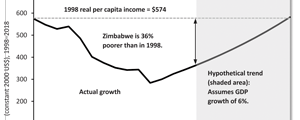
TALK is cheap, but for Oprah Winfrey and other renowned television personalities, talk is big business.
Report by Bernard Mpofu
Zimbabwe has since the formation of the inclusive government convened various investment conferences to woo foreign direct investment (FDI) which at peak averaged 20% of the gross domestic product.
Among some of the notable indabas that have been convened since 2009 is the Deat Capital and London Stock Exchange roadshow to Zimbabwe of February 2009, the Euromoney Zimbabwe Investment Conference, Diamond Conference, Zimbabwe Infrastructure Investment Conference and most recently the Zimbabwe High-Level Investment Conference held in South Africa last week.
Notwithstanding this, “high-level” business delegates that have touched down at Harare International Airport over the past four years are too many, making headlines in local media.
But all this has brought no significant benefits to the country.
The unequivocal message that continues to resonate from over 10 investment conferences held within and outside the country is that policy uncertainty is inhibiting investment.
Faced with the realities of the post dollarisation era, the government is virtually left with no option to increase money in circulation.
- Chamisa under fire over US$120K donation
- Mavhunga puts DeMbare into Chibuku quarterfinals
- Pension funds bet on Cabora Bassa oilfields
- Councils defy govt fire tender directive
Keep Reading
The stalled $750 million Essar Africa Holdings investment was anticipated as a precursor to open floodgates of investments in Zimbabwe.
Intransigence within the inclusive government and suspicion of kickbacks in inking the deal has lately been the barrier for implementing the deal which was widely expected to breathe life to the country’s cash-spinning steel industry.
Two years on since President Robert Mugabe commissioned the multi-million-dollar project, blast furnaces at Ziscosteel remain dormant.
That capital is shy is something our government seemed not to have fully comprehended. Discord and policy uncertainty has over the years left investors adopting a wait-and-see approach. Up to now, despite great potential and the hype, the potential investors remain seated on the fence knowing little of where to jump.
As the epilogue nears for the compromise government formed after a disputed “sham” election of 2008, clearly the country has failed to ride on the post inclusive government euphoria.
Politics of the day remains the game changer. Until and unless the country gets it right on the political front, investment conferences will become nothing but pathetic, useless talk shows.
The general feeling within and outside the government is that with the politics right, Zimbabwe could achieve the ambitious $100 billion economy in 30 years.
Experts say Zimbabwe has to tackle economic indicators and ease the hassles of doing business in the lowly-ranked southern African country before the country can experience increased economic activity, whose peak FDI reached $444 million in 1999 and a low of $52 million in 2008.
Intra-government clarity on the Indigenisation and Empowerment Act compelling foreign-owned companies to sell 51% stakes to locals remains critical.
For investors, a new government has now become the only hope. So glaring is the discord in the coalition that local politicians have taken time to snub, outshine, humiliate and in some cases taunt each other at national investment conferences.
For as long as the same government is divided on semantics over sanctions – with some calling them economic sanctions, while others call them restrictive measures – any reform by the State could take the 13 million population one step forward and five steps back.
Despite the apparent tiff within the shaky coalition government, Vice-President Joice Mujuru has in the past attended such conferences organised by the government, private sector and Zanu PF, a sign that has often been seen as government commitment to attract the much-needed capital.
But in the end, the country continues to record high levels of unemployment, cost of living continues to rise and pressure continues to mount on politicians as they sharpen their swords ahead of watershed elections slated for later this year.
As government plans to take its investment campaign to Mozambique through its globetrotting expedition, should the already-squeezed taxpayer continue financing such conferences or keep fingers crossed hoping for a brighter day?
As the mineral-rich Zimbabwe turns 33 on April 18, should history depict the country as another resource curse?











